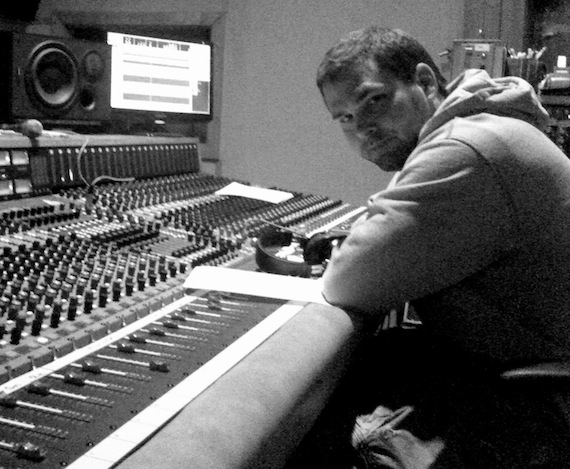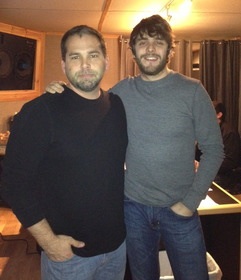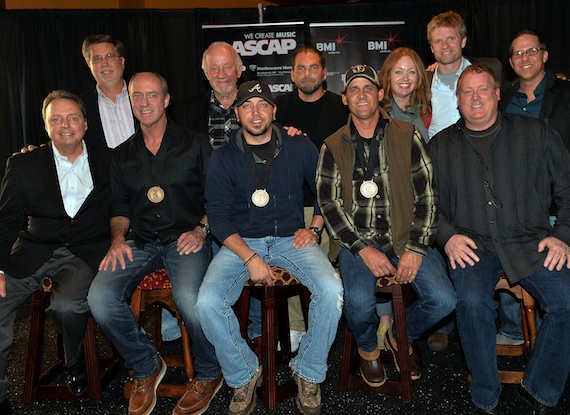

By James Rea
Don’t miss Knox’s fourth appearance at The Producer’s Chair on Thursday, Jan. 30, 6 PM at Douglas Corner.
Is there anything that Michael Knox can’t do? Since Knox helped propel Jason Aldean to superstardom, he has become one of the most sought-after producers in Country music. Aldean’s “Night Train” was Knox’s twelfth No. 1 single and Thomas Rhett’s “It Goes Like This,” marks Knox’s thirteenth No. 1.
His body of production work also includes Trace Adkins, Big SMO, Ludacris, Montgomery Gentry, Bush Hawg, Randy Owen, Josh Thompson, Frankie Ballard, Hank Williams Jr., and music production on the hit TV series Nashville.
Some of Knox’ more recent accomplishments include the 2011 CMA Album of the Year, Jason Aldean’s My Kinda Party; 2013 ACM Vocal Event of the Year, “The Only Way I Know” by Aldean, Luke Bryan and Eric Church; 2012 ACM Single Record of the Year and Vocal Event for Aldean and Kelly Clarkson’s “Don’t You Wanna Stay.” He was nominated at the recent Grammy Awards for Best Country Album (Aldean’s Night Train).

Pictured (L-R): Michael Knox and Thomas Rhett.
As Senior Creative Director at Peer Music for the past three years, Knox’s stats have gone through the roof. “We’ve had a lot of cuts and a lot of big singles over the past two years,” he said. “Neil Thrasher and Vicky McGehee are our writers on Randy Houser’s ‘How Country Feels.’ I signed both of them. I brought in Michael Tyler and Jaron Boyer. I hired Kim Wiggins to help do the song-plugging and run the creative department, then I signed Rachel Farley and Shaun Ames of Bush Hawg.”
And with Senior Creative Director Shalacy Griffin, Knox launched production/management company Music Knox, with the signing of Rachel Farley (Red Bow), Bush Hawg, and Knox’s latest discovery Michael Tyler.
Knox is in his second term on the CMA Board, he serves on Grammy Special Committees and he was recently appointed to the ACM Board.
The Producer’s Chair: Other than a shortage of time, what is your biggest challenge?
Michael Knox: Juggling family and work is the toughtest. I’ve got 17 and 13 year old kids, and I’ve been with my wife for 27 years. So it’s tough because I feel as if I’m in my prime and I want to give 150% to my job. The business struggle is not being able to exercise what I do. I still have to go through somebody else in order to achieve something. I can find Elvis Presley today but, I can’t get him to be Elvis without going through other channels.
Who has been your mentor, when it comes to producing?
The guy that I’ve learned the most from is Peter Coleman. I met Peter in the early 90s, when I started cutting demos. When I decided I wanted to be a producer, I wanted to find an engineer that heard things like I heard it because at the time I wasn’t an engineer. I engineered a lot in college but I got away from it and started realizing that I didn’t want to limit the artist’s abilities to my abilities. Sometimes they want something that I can’t do. Some engineers and producers that can’t do that will talk them out of it and then they don’t get to go down that route. My goal was to find a team of people where we can accomplish different things. Peter did The Knack’s ‘My Sharona,’ Blondie, Pat Benatar and he was Mike Chapman’s engineer back in the early days on ‘Kiss You All Over,’ all the way to ‘Hot Child in the City.’ That’s what I wanted my country to sound like. Then when I bumped into Peter in the early 90s, I thought, imagine what his alternative rock sounds could do with my commercial ears. I was looking for an arena-rock situation at that time because we didn’t have it. Peter taught me how less is more. If you find yourself using a lot of tricks, you might want to examine the artist you’re working with.
What is the most important aspect of producing records in today’s climate, that all producers, in all genres are realizing?
If you don’t have a ‘real’ artist, your work’s cut out for you. The challenge is to find an artist that you’re intrigued by and want to know more about it. As long as we’re cutting singles and not cutting records, we’re going to have that problem finding artists. An artist can take you on a journey through 12 songs. A great singer, who is probably a better singer than the artist, doesn’t intrigue people. We’re selling millions of singles, but we’re not selling millions of albums and that requires people who can tell the difference between a great singer and a great artist.
How instrumental are you in directing the artist’s vocal performance in the studio?
It’s my job to know who they are by watching them perform live and making sure that I capture that in the studio. Their live performance is what gets them signed. If they go on ‘David Letterman’ and sound different than their recordings, we’re screwed.
What is the network like among Nashville’s top producers?
It’s competition when you don’t know each other. Now that I’m on the CMA and ACM boards, and on the Grammy’s Special Committees and I’m hanging with these guys on a day-to-day basis, I know we’re not in each other’s space. Once you get to know them, you understand that you all do very unique things. The only times we’re competing with each other is when A&R people are putting three or four producers on a record. When we get together, we’re like a bunch of kids. We’re always cutting-up and having fun because we know the inside humor of everything.
What is the most important aspect of artist development?
The main thing that I see in artist development is trying not to make the artist something they’re not. I’ve had that work against me a few times early on, where I saw them as something else and I really drove them that way because it sounded better, but it never lasted because, once go-time happens, they can’t sell it. The main job that I have is, instead of telling them what I think they should do, it is listening to what they want to do and help them get there.
Not every relationship is the right relationship. Have you ever headed down that road with an artist and decided to put the brakes on?
When I was at Warner/Chappell, there were a couple of acts and I loved their voices and I signed them and once we got to know each other, we were so off pace with what each other wanted to do, we had to part ways. I’ll take all the blame for things like that because I should have paid attention a little longer, before I invested the money.
Developing artists costs money. Who pays the tab?
With my acts, I’m usually putting up that money. That’s why I don’t work with a lot of acts. Once I start spending my own money, then I believe in it. Your ultimate goal is to go and get a label to partner with you, or sign them at a publishing company and get a budget from them, which is what we’re doing here at Peer.
Why did you get into management?
The main reason I got into management was to keep control of the creativity of where the artist is going. I’ve developed a lot of talent and been part of a lot of things that have gotten screwed up. Our main objective is to make sure the artist knows where they’re going and what they’re doing, whether they’re on a radio tour or sitting around the house. You have to make sure that all elements are on the same path. It’s hard being the bad guy, who goes in there to shake it up and that’s the toughest part for me but, a lot of managers are business focused and we’re trying to keep things creatively focused.
Is being an artist a preferred pre-requisite for a publishing deal these days?
They tend to lean that way right now. I’ve shown them that you don’t have to write to sell 10 million records. Jason has only written five or six songs that we cut. A lot of people are looking for those because they feel that they can control the copyright more but I still believe that Nashville is the home of the songwriter, so that’s not a deal-breaker for me.
In the past, we’ve talked about your interest in running a label. Would you prefer to run an existing label, or start your own label?
I would prefer to be in charge of the creative or A&R department of the label. That’s my strength. Look at MCA back in the ‘90s. The Tony Brown/Bruce Hinton thing was probably one of the better models you’ll ever see. You had a true creative guy and a true business guy and they never got in each other’s way. I’ve been in publishing and artist development, but I haven’t done the label thing yet and I need that to go full circle in this business.
Which hat do you enjoy wearing the most?
It’s finding the artist and developing them into what they can be. I’ve been working with Michael Tyler since he was 14 and have watched him grow. He’s 20 now. Rachel Farley was 13 and now she’s 18. I’ve spent six years with Bush Hawg and I’m now at 16 years with Jason Aldean (five years before he got his deal with Broken Bow). I get a big kick out of them getting to where we’re trying to go because I know they busted their butt to get there. To watch that is amazing. It doesn’t matter if it’s a songwriter or an artist. I love developing the talent and watching them grow.

BMI, ASCAP, Broken Bow Records and Music Row gathered in October 2013 at Nashville’s The Pub to toast the team behind Jason Aldean’s No. 1 song “Night Train.” The song was co-written by Michael Dulaney and Neil Thrasher. Pictured (back row, l-r): peermusic’s Kevin Lamb, Broken Bow Records’ Benny Brown, producer Michael Knox, Warner-Tamerlane’s Alicia Pruitt, BMG Chrysalis’ Kos Weaver, and Broken Bow Records’ Jon Loba; (front row, l-r): BMI’s Jody Williams, co-writer Michael Dulaney, Jason Aldean, co-writer Neil Thrasher, and ASCAP’s Mike Sistad. Photo credit: Rick Diamond

Category: Featured


